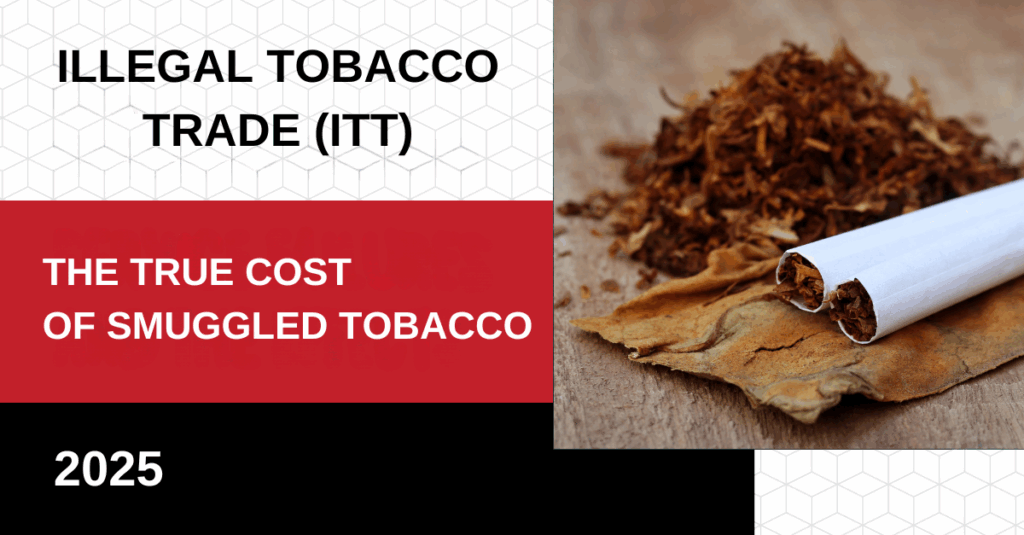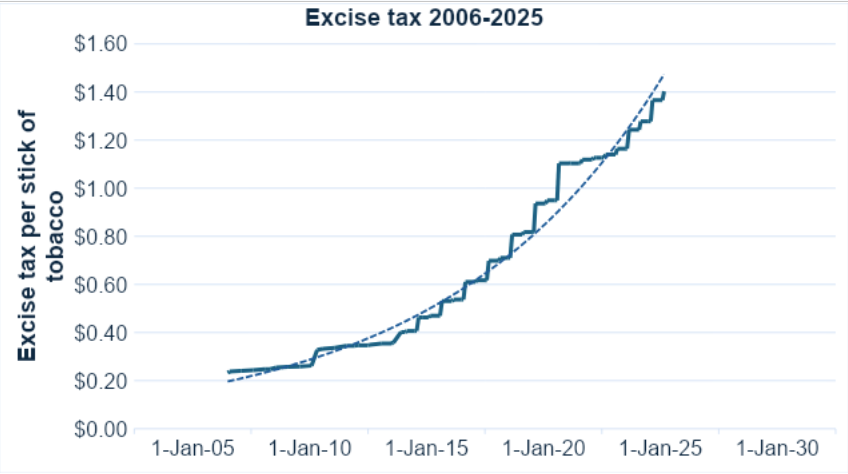
‘Smuggling’ at section 4 of the Customs Act 1901 is defined as ‘any importation, introduction or exportation or attempted importation, introduction or exportation of goods with intent to defraud the revenue.’
Persons who import tobacco products to Australia without paying the correct taxes are defrauding the Commonwealth and are smuggling.
The Customs Tariff Act 1995 defines the amount of tax to be collected by the ABF.
The correct taxes for importing tobacco products are (1) import duty and (2) GST.
The Australian Border Force (ABF) is to collect $1.40312 per stick (per cigarette that contains less than 0.8 grams of tobacco content), and
The ABF is to collect the GST of 10%
The Excise Tariff Act 1921, schedule 5.1 defines the excise tax.
The Australian Taxation Office states that when manufactured tobacco goods are imported into Australia, they are subject to customs duty. This duty is:
- paid at the time the products arrive at the Australian border
- equivalent to the following tobacco excise rates.
The Australian Taxation Office (ATO) relies on the Australian Border Force (ABF) to collect the import duty and GST on its behalf.
Excise tax is a federal tax administered by the Australian Taxation Office.
The excise tax on tobacco was created as a ‘sin tax’. Tobacco is one item that is sin-taxed, as those who consume tobacco generally experience more health-related problems than a non-smoker.
Health insurance companies charge a higher premium for smokers versus non-smokers.
Life insurance companies charge a higher premium for smokers versus non-smokers.
Excise taxes are indexed and increase regularly, just like health and life insurance policies increase with age.
The excise tax on 01 July 2006 was $0.23259 per stick. The excise tax on a packet of 20 cigarettes was $4.65. The excise tax on a packet of 40 cigarettes was $9.30. Then, you needed to add 10% GST and the importer’s profit.
The excise tax on 01 March 2025 is $1.40312 per stick. The excise tax on a packet of 20 cigarettes is now $28.06. The excise tax on a packet of 40 cigarettes is now $56.12. Then, you must add 10% GST and the importer’s profit.
The federal government receives these excise taxes to assist in paying for other federal programs, like Medicare.

When illegal tobacco passes through the Australian Border, the taxes are not collected or received, but the federal government’s expenses continue to increase.
The money that is received to support the illegal tobacco trade, does not enter the federal bank account, it is entering bank accounts that do not pay to assist with federal government programs.
If the federal government receives less money from excise tax, and if Medicare is one of the most significant liabilities for which the government is responsible, then Medicare comes under the spotlight. How will Medicare be funded? Will the government need to increase the GST from 10% to 15%? Will income taxes need to rise? The latest idea is to use tax-specific superannuation scenarios.
Legitimate people have made legitimate payments into their superannuation throughout their working careers; now, they may need to pay a superannuation tax.
Those who arrange and support the illegal tobacco industry are enjoying cheaper tobacco products, and they are also enjoying the benefits of Medicare. Doesn’t this sound dysfunctional?
The Parliamentary Budget Office (PBO) stated on 14 November 2024, ‘tobacco excise is also in decline due to a long-run reduction in smoking rates. In recent years, the decline in excise volumes has been offset by large increases to the rate. This may have resulted in an increase in illicit tobacco products to avoid the tax, illustrating the trade-offs between using tax to motivate behavioural change and the motivations for non-compliance.’
I wonder if the above statement is entirely accurate. Genuine tobacco shipments are classified with an eight-digit harmonisation classification, entered, and tax paid. However, illegal tobacco is not entered through customs entry, and taxes are not paid; if illegal tobacco is not entered and accounted for, does the government really have the correct data and picture?
I wonder what the penalty is for non-compliance with illegal tobacco imports.
Illegal tobacco importation is the responsibility of the Australian government, which gives that authority to the Australian Border Force. Suppose the Australian Border Force is not capturing the illegal tobacco trade. In that case, the ATO is not receiving the tax, and the Australian government is not paying the tax for other federal programs. If the ABF is unable to capture the illegal tobacco trade, then the ABF should be advising the Australian government that the ‘horse is bolting’ or that the ‘horse has bolted’.
However, the PBO did say, ‘Governments will need to consider if they would prefer to compensate for this lost revenue through continued bracket creep, by raising taxes from other sources, by reducing spending or some combination of all 3. Should they choose to find additional funds through bracket creep, average personal income tax rates would need to be around 1.5 percentage points higher than otherwise. Under our baseline, where average personal income tax rates rise to 28.5%, the decline in excise would lead to these rates increasing beyond 30%.’
The Australian government needs to go back to the round table and develop a plan to collect the correct excise tax that they are entitled to collect. I know what is needed to fix the issue, but I’ll leave that to a future Ph.D.
Illegal tobacco is only one issue; other issues involve firearms, illegal drugs and or weapons [knives].
I’ll rely on this commentary and reflect on it in months and years to come. Will things change, or will they get worse?
